Denver’s Business District Becoming Neighborhoods; Another 1,837 Apartments Planned In The Coming Year
by Glen Richardson
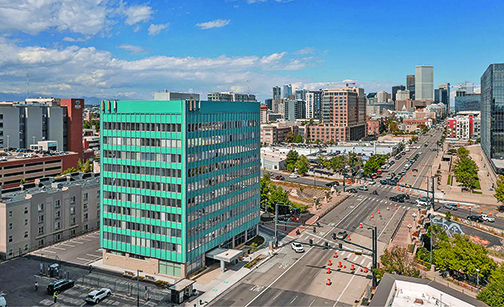
Best Of Broadway: This nine-story medical building was renovated into studio and one-bedroom apartments. Fourteen units are for unhoused patients released from Denver Health.
If you’ve noticed some old buildings getting a new lease on life in Denver, you’re right. The Mile High City ranks among the nation’s top spots for apartment conversions, with about 300 apartments entering the market through adaptive reuse in 2023 — and there are six times more such apartments on the horizon.
In addition to generating more apartments, the trend is likely to bring more people and energy to downtown Denver, hard hit by the pandemic’s work-from-home deluge. Residential conversions are anticipated to bring people and new energy to downtown apart from the workday. If so, stores, restaurants, entertainment, and other amenities of a vibrant lifestyle will optimistically return.
RentCafe’s annual adaptive reuse report shows that apartment conversions are on the rise again in the U.S., having increased by 18% in 2023 compared to the previous year. Plot twist: While office conversions are usually the go-to for future projects, hotel conversions rocked the charts in 2023, hitting a record high. Yet, with 58,000 office projects in various development stages nationwide, office conversions are expected to take the lead again.
Mile High Style
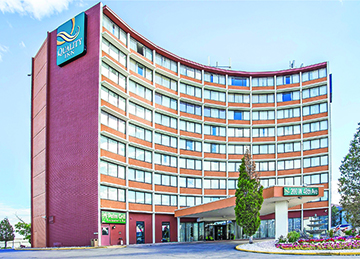
Clarion Converted: Renamed Renewal Village, the 215-room Clarion Hotel is the largest Mile High hotel converted to apartments to date.
Denver is part of the trend, with around 1,000 new units projected to be created through repurposing former office spaces.
Denver ranks 8th among cities with the most conversions in 2023. Developers successfully transformed a school building into 190 apartments, and a 1956 office building located at 655 Broadway is now home to 110 new apartments.
Looking ahead, The Mile High City is a major player in future apartment conversions, with plans to bring 1,837 new apartments to life in the coming year. Office conversions prevail (1,002 units), while repurposed schools (420 units) and hotel conversions (261 units) are also set to expand Denver’s rental market. The remaining units will come from residential conversions.
Metro Area Trend
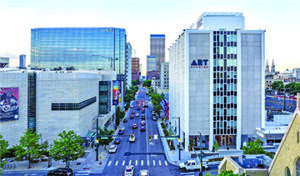
Street Art: The 10-story Art Institute building was converted into 192 apartments named Art Studios. Nichols Partnership was the hammer that shaped the new art piece.
In the Denver-Aurora-Lakewood metro area, office conversions are expected to be the most popular, mainly due to the 1,000 projected units in the capital city. Following closely are hotel conversions (937 units), including 576 apartments expected to be retrofitted in Aurora.
Adaptive reuse refers to the process of converting an existing building for purposes other than those it was originally designed for. In this article, adaptive reuse is expressed as the conversion of an existing building into rental apartments. The RentCafe study is based on apartment data related to buildings containing at least 50 units.
Data, of course, is subject to change. New properties and markets may emerge, while some properties might not be completed or maintain the same status (other than completed) for several years. Additionally, various factors such as delays, sales, or project abandonment can prevent completion of some properties. Future projects encompass those currently undergoing conversion, as well as those in the planning and prospective redevelopment stages.
Long Local History
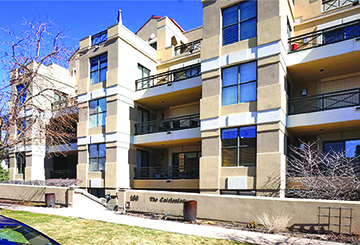
Creek Condos: This office building on Cook St. in Cherry Creek was converted into 44 condos named Catalonian at Cherry Creek in the late 1990s.
Conversion of old buildings has a long history in Denver. Marcel Arsenault, founder and CEO of Real Capital Solutions, did his first office-to-residential conversion in Cherry Creek in the late 1990s. The building’s offices were converted to 44 condos, now named Catalonian at Cherry Creek at 180 Cook Street. It was an old office building, and so the price was low. At the same time Cherry Creek residential values were high. Everybody wants to live in Cherry Creek; thus, it made sense for Arsenault to do residential
In 2006, 1600 Glenarm Place, a 31-story tower at 16th Street Mall, was turned into more than 300 units. In 2015 Nichols Partnership converted the former Hotel VQ next to Bronco’s stadium into Turntable Studios, a 13-story complex with 179 studio apartments. In 2022, the owner of Denver’s Petroleum Building filed plans to turn the office building into around 130 apartment units.
Nichols Partnership completed the 10-story, 192 apartment Art Studios — the former Art Institute of Colorado building — in the first quarter of 2023. Located in Denver’s Golden Triangle neighborhood, conversion of the building acquired in 2019 was delayed by the pandemic. Using leftover materials for the school, the rebuild honors the building’s history. Nichols Partnership also converted the five-story One Platte office building, at 1701 Platte St. Completed in the spring 2022, it’s now 90% leased, a testament to both the building and the Platte St. location.
Hotel Renovations
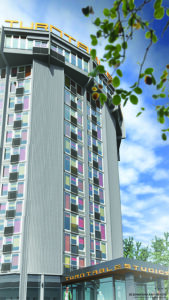
Turntable Trend: In 2015 the former Hotel VQ next to Bronco’s stadium was converted into Turntable Studios, a 13-story complex with 179 apartments.
Denver’s hotel conversions have virtually all been for the city’s homeless plus the migrant invasion. The earliest was in February, 2020 when a former Quality Inn & Suites on Quebec Street in Park Hill was converted into apartments known as Fusion Studios. The changeover provided transitional and long-term housing. At that time, the city required residents to pay up to 30% of their monthly income as rent.
With a new mayor and city council, Denver has been purchasing hotel housing — albeit mostly older properties and most often motels — at a record-setting pace. The tempo has been so fast neither the media nor citizens can keep pace. Here’s a sampling: New Directions, a former Best Western in the 4500 block of N. Quebec St. The city paid $25.95 million for the 194-unit property; Tamarac Family Shelter, previously an Embassy Suites on East Hampden Ave., Denver paid a combined $30.9 million for lease-purchase; Clarion Hotel is Denver’s largest to be converted to housing for the homeless. Renamed Renewal Village, the 215-room hotel was purchased in Jan. 2023 for $24 million — $10 million each from Denver and the Colorado Division of Housing, plus $3.6 million from Adams County.
